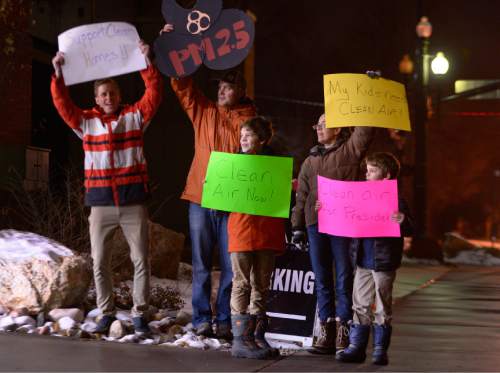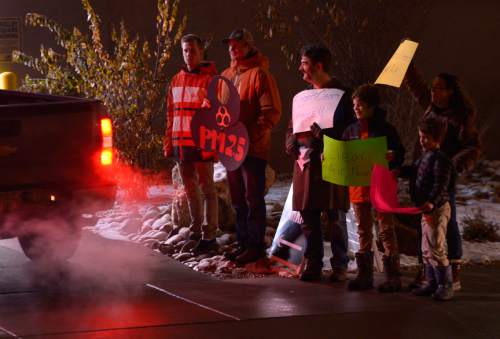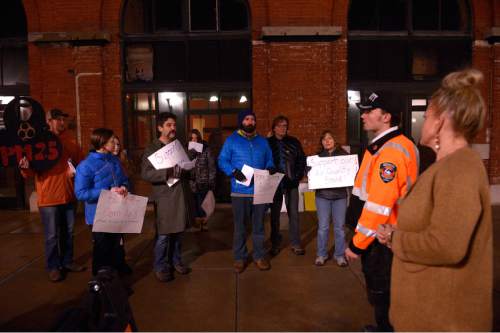This is an archived article that was published on sltrib.com in 2016, and information in the article may be outdated. It is provided only for personal research purposes and may not be reprinted.
The Utah Home Builders Association had a few unexpected guests at its Friday evening awards gala — a group of clean air advocates who denounced the association for becoming what activists consider a substantial roadblock on Utah's path to cleaner air.
The demonstrators, including representatives of Utah Moms for Clean Air, HEAL Utah and Utah Physicians for a Healthy Environment, gathered outside the association's annual event to wave signs and distribute leaflets to passers-by and party-goers alike — raising awareness, they said, of the association's role in trying to defeat some of the clean air policies the state proposed last year.
Actions taken by the Utah Home Builders Association have been instrumental in delaying the approval of both the low-nitrogen oxide (NOx) emitter water heaters rule, and the revised 2015 state building code, said Matt Pacenza, executive director of HEAL Utah. He said he and other activists believe both measures were "common sense" policies that enjoyed widespread, bipartisan support among Utah residents.
Both issues, Pacenza said, met an untimely demise in interim sessions last fall when the home builders association raised objections. The update to the state building code, which by state statute must undergo a legislative review on a regular basis, was tabled in committee. The water heaters rule, which was set to take effect in 2017 after being approved by the state Air Quality Board, was placed on a sunset list that would kill the rule barring further legislative action.
Pacenza said he doesn't believe the public — or even the home builders association's general membership — are aware that the association has lobbied against these clean air initiatives. And, he said, he doesn't believe they would agree with that position, were they aware of it.
"We want the public to understand that this is the direction we must go, and that we have this powerful trade association standing in the way," he said. "And we want individual builders to push from within. Maybe this doesn't reflect what the members want."
But Ross Ford, the executive vice president of the Utah Home Builders Association, said the group does support those policies — it just wants to ensure that they go through the proper screening procedures.
"I don't think there is anybody, including [the demonstrators], who is more dedicated to clean air and a healthy environment than us," he said. "We haven't blocked any good sense rules. There have been some things that were moved forward in a fairly illegal fashion, but we're not actively blocking anything that works."
The trouble with the water heaters rule, Ford said, was that the Air Quality Board passed the initiative without first addressing concerns about whether the water heaters actually work.
"There is a significant concern about the safety of the [low NOx] water heater," he said. "We want to make sure it runs through the proper group of experts. That's all we've asked for…. If this is what everyone says it is, we're 100 percent in support of it."
Likewise, Ford said, the association wanted to ensure the new building codes were reviewed thoroughly to eliminate any possible manipulation by special-interest groups pushing to get their products, which he said are often of little benefit to the environment, incorporated into the new code.
Ingrid Griffee, executive director of Utah Moms for Clean Air, said she believed the association was being disingenuous.
"If it really were about the process, it seems it would have been very simple to say, 'Yes, we would support that bill when it comes up,' but that isn't what was said in the committee," she said.
Griffee said she felt regulatory measures like the low-NOx water heaters rule, which would have barred Utah retailers from selling water heaters that did not meet certain emissions standards, were an easy way to ensure cleaner, healthier air for future generations.
"A lot of people feel the same way," she said, "and wonder why this would be a contentious issue in our state Legislature."
Twitter: @EmaPen







